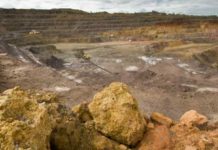
[miningmx.com] — THE National Union of Mineworkers (Num’s) has reiterated its support for the nationalisation of mines, but said such a policy should be informed by the country’s developmental needs and not be used as a political tool “for picking candidates’.
Num’s parliamentary officer Madoda Sambatha said on Thursday the union’s stance on the matter was informed by the Freedom Charter, insofar that the country’s mineral resources should be exploited for the benefit of citizens.
“We are for nationalisation, but not a nationalisation that creates chaos,’ Sambatha said, speaking at a seminar hosted by the Gordon Institute of Business on progress in the implementation of the mining charter. “Nationalisation should be interventions to attain objectives.’
Pointing to examples, Sambatha said state intervention could attain cheaper iron ore for infrastructure development. Similarly, the provision of coal at cost to Eskom could raise the country’s competitiveness and contribute to the security of power supply.
“Government until now couldn’t describe to SOE’s (state-owned enterprises) what their priorities should be,’ Sambatha said. “We are not for state capitalisation, because it simply removes private investors as owner.’
According to an official policy document released in June, the union said it was not prepared to debate nationalisation as a campaign or nomination tool for the ANC’s national conference in 2012. It said the debate should be centred around the policy shifts necessary to support the New Growth Path.
“Socio-economic challenges and failures by the mining industry to adhere to either transformation or mining charter requirements have allowed populist demagoguery to triumph, calling for nationalisation as the solution to all these challenges,’ the document read.
It placed particular emphasis on the role of a state-owned mining company, as well as beneficiation.
The state-owned miner should be run by an independent board, said the union, which should be directly accountable to parliament. Its objectives should be to change South Africa’s over-dependence on the exporting of natural resources by investing in beneficiation and mineral based industrialisation.
The profits of the state miner should, by law, be distributed to health (20%), free education (20%), rural development (20%) and re-investment in the company itself (40%).
Sambatha said beneficiation should become a compulsory requirement for the granting of mining rights; an issue the union wants to see addressed in the current review of the Mineral Resources and Petroleum Development Act.
“How can you push for beneficiation when you leave it as a matter of choice?’ said Sambatha, threatening strike action if the union did not get its way.
Minister of Mineral Resources Susan Shabangu on Thursday praised Num for tabling alternatives in the nationalisation debate.
“The response of Num indicates that.there is still a lot to be done with regard to transformation of the mining industry,’ Shabangu said. “The mining industry cannot and should not be content with the exercise of ticking boxes merely for the sake of complying with the targets of the mining charter.
“The industry should wilfully embrace transformation as a business imperative rather than a fruitless compliance exercise dressed in number crunching.”










